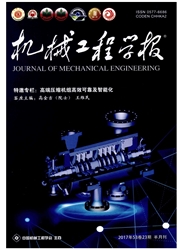

 中文摘要:
中文摘要:
研究了以电网、动力电池和超级电容为动力电源的储能式混合动力有轨电车。首先介绍该类有轨电车的混合动力系统结构,提出一种基于系统工作模式的逻辑门限式能量管理策略,通过多个控制参数实现工作模式的切换。针对能量管理策略中控制参数的不确定性,将整车车载电源的最小配置成本以及列车运行的能耗、准时性、准地点停车作为优化目标,应用多目标遗传算法对影响列车动力性能的主要能量管理策略控制参数进行了优化分析。结果表明,优化后列车的牵引运行能耗减少了约6.8%,再生制动能量的回收率提高了约2.4%。同时,通过优化得到了电源的最小配置,为电源的冗余配置提供参考。
 英文摘要:
英文摘要:
A tramway with an onboard energy storage system is studied with catenary, battery and ultracapacitor as power supply. The structure of tramway hybrid system is introduced, an energy management strategy is proposed based on system operation mode, switching from a number of control parameters. Due to the uncertainty of the control parameters in the energy management strategy, the multi-objective genetic algorithm (GA) is applied to optimize the contr-ol parameters in the control strategy, the minimum cost of energy storage system, the energy consumption of tramway operation, punctuality and tramway precision stop are taken as the optimization goals. Optimization results show that the traction operation energy consumption of the optimized tramway is reduced by about 6.8%, and the recovery rate of regenerative braking energy is increased by about 2.4%. Meanwhile, the minimum configuration of the energy storage system is obtained by optimization, which provides the reference for the redundant configuration of the power system.
 同期刊论文项目
同期刊论文项目
 同项目期刊论文
同项目期刊论文
 Global stability of complex-valued neural networks with both leakage time delay and discrete time de
Global stability of complex-valued neural networks with both leakage time delay and discrete time de Stabilization and synchronization of chaotic systems with mixed time-varying delays via intermittent
Stabilization and synchronization of chaotic systems with mixed time-varying delays via intermittent String stability of infinite-dimension stochastic interconnected large-scale systems with time-varyi
String stability of infinite-dimension stochastic interconnected large-scale systems with time-varyi Passivity Analysis and Passive Control for T-S Fuzzy Systems with Leakage Delay and Mixed Time-Varyi
Passivity Analysis and Passive Control for T-S Fuzzy Systems with Leakage Delay and Mixed Time-Varyi Passivity and passification for stochastic Takagi–Sugeno fuzzy systems with mixed time-varying delay
Passivity and passification for stochastic Takagi–Sugeno fuzzy systems with mixed time-varying delay An analytical design approach for self-powered active lateral secondary suspensions for railway vehi
An analytical design approach for self-powered active lateral secondary suspensions for railway vehi 期刊信息
期刊信息
